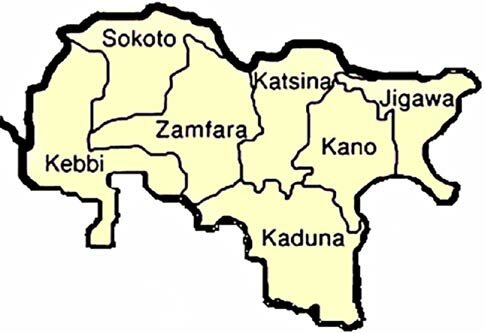North West governors: Tackling regional challenges together
The North West geo-political zone is presently confronted with formidable challenges that demand immediate attention and effective solutions. Insecurity, poverty and limited access to education have become pervasive issues, necessitating a collective effort from the seven North West governors to transcend political affiliations and work together. The impact of these challenges extends beyond the disruption […]

The North West geo-political zone is presently confronted with formidable challenges that demand immediate attention and effective solutions. Insecurity, poverty and limited access to education have become pervasive issues, necessitating a collective effort from the seven North West governors to transcend political affiliations and work together. The impact of these challenges extends beyond the disruption of millions of lives, impeding economic growth and deterring crucial investments in the geo-political zone.
Urgent measures and a united front are imperative to address these pressing issues and create a brighter future for the North West.
The recent acts of terrorism across the North, resulting in brutal killings and abductions of innocent residents, are deeply distressing. This violence extends to parts of Kaduna, Katsina, Sokoto, Kebbi, and Zamfara states.
However, the strategies employed by the previous group of governors in the zone have proven to be ineffective. Measures such as dialogue with terrorists, cash incentives, telecommunication shutdowns, bans on motorcycles and mining activities, and even carpet bombing have failed to quell the escalating violence.
- TotalEnergies discovers oil, gas on OML102 offshore Nigeria
- NIGERIA DAILY: Will The 10th Assembly Be Another Rubber Stamp?
Furthermore, the current approach of individual meetings between state governors and security chiefs, instead of a collective synergy, adds to the disjointed response. While promoting self-defence and prayers against terrorists is not wrong, tangible actions and effective strategies are equally essential.
The lack of coordination among the North West governors has resulted in delays in policy implementation, exacerbating socioeconomic problems and reducing productivity in public services. These challenges are particularly acute in the North, where high poverty and unemployment rates persist, and millions of people live below the poverty line.
Additionally, the North has a staggering number of out-of-school children, with approximately 20 million lacking access to education, which accounts for 20 per cent of the total population. Notably, this figure surpasses the population of various countries in Africa.
The urgency to address these challenges requires passionate action and unwavering commitment. Cooperation among the current seven North West governors can potentially address the socioeconomic disparities in the zone by enabling the redistribution of wealth and resources, leading to social justice.
By collectively addressing issues such as poverty, illiteracy, and unemployment, the governors can uplift marginalised sections of society and work towards creating a more equitable society.
Adopting a unified front allows the governors to tackle the root causes of insecurity, implement social and economic policies, and create an environment conducive to development.
The current group of governors must objectively overcome administrative challenges by embracing solidarity, cooperation, and shared responsibility. They can establish an efficient administrative framework by setting up mechanisms for regular communication, sharing information, and making joint decisions.
Enhanced coordination will overcome bureaucratic hurdles and streamline processes, resulting in increased productivity in the northern region and the efficient delivery of public services, ultimately contributing to sustainable development.
Collaboration in good faith is crucial in addressing the security challenges in the whole northern region. By rising above party lines and working together, the governors can develop comprehensive strategies that foster greater collaboration in intelligence sharing and joint law enforcement efforts, including vigilante groups. Working as a group would streamline decision-making processes, reduce duplication of efforts, and enable the governors to allocate resources effectively.
The North West has some of the highest poverty rates in the country, with millions of individuals living in dire conditions. There is a need for the equitable distribution of wealth and resources to ensure that development benefits reach the most marginalised.
By pooling resources, sharing best practices, and implementing coordinated poverty alleviation programmes, the North West governors can take a decisive step toward reducing the region’s poverty rate.
This collective effort will create comprehensive social safety nets, job opportunities, and access to basic services crucial for uplifting impoverished communities.
Positive cooperation among the governors can revitalise education in the area, which is currently facing a severe crisis with a high number of out-of-school children.
Education holds transformative power, empowering individuals and facilitating social mobility. To tackle this issue, the North West governors must unite and combine their expertise, resources, and innovative approaches to develop targeted strategies that address the region’s specific educational gaps. They can make significant progress by focusing on increasing enrolment, improving infrastructure, and enhancing the quality of education.
Additionally, their collective action can attract national and international support, amplifying the impact of their educational initiatives.
Therefore, cooperation among the seven North West governors, regardless of their party affiliations, is crucial in pursuing a more equitable and prosperous region. These leaders can unlock the potential for transformative change by putting aside ego and selfish interests, unlike their predecessors.
A collective approach will help them tackle insecurity, poverty, educational gaps, and administrative hurdles. Through unity and shared objectives, they can tap into the power of collective action, paving the way for progress and development that benefits the entire populace.
In the face of mounting obstacles, let us not underestimate the strength that lies in working together. By combining our passion, ideas and resources, we can forge tangible solutions that empower our communities and lay the foundation for a future defined by peace, prosperity, and social justice.
It is within our reach to shape a brighter tomorrow, where the North West thrives as a beacon of hope and opportunity. Now is the time for these governors to set aside their differences, collaborate in synergy, and embark on a journey that brings about meaningful and lasting positive change.
